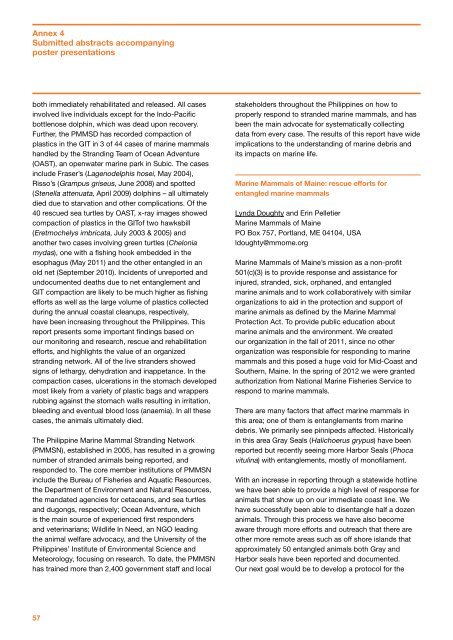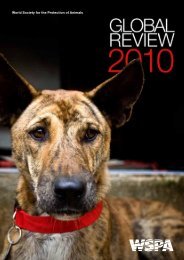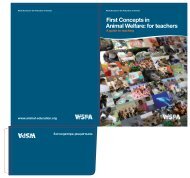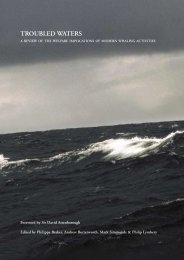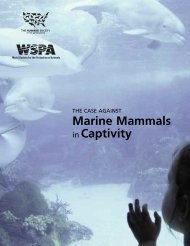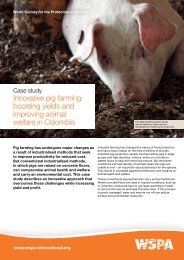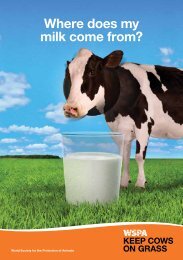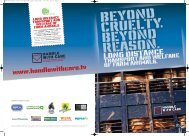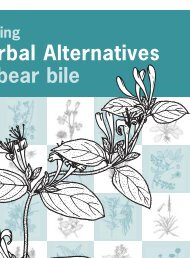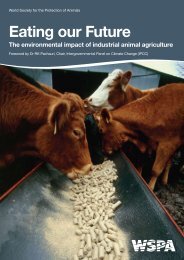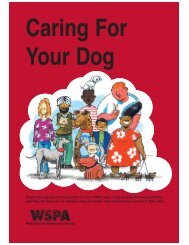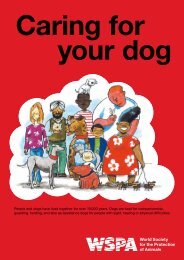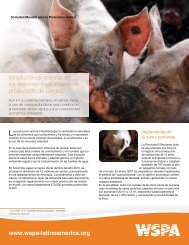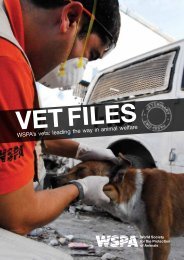Proceedings of the Untangled symposium: - WSPA
Proceedings of the Untangled symposium: - WSPA
Proceedings of the Untangled symposium: - WSPA
Create successful ePaper yourself
Turn your PDF publications into a flip-book with our unique Google optimized e-Paper software.
Annex 4Submitted abstracts accompanyingposter presentationsboth immediately rehabilitated and released. All casesinvolved live individuals except for <strong>the</strong> Indo-Pacificbottlenose dolphin, which was dead upon recovery.Fur<strong>the</strong>r, <strong>the</strong> PMMSD has recorded compaction <strong>of</strong>plastics in <strong>the</strong> GIT in 3 <strong>of</strong> 44 cases <strong>of</strong> marine mammalshandled by <strong>the</strong> Stranding Team <strong>of</strong> Ocean Adventure(OAST), an openwater marine park in Subic. The casesinclude Fraser’s (Lagenodelphis hosei, May 2004),Risso’s (Grampus griseus, June 2008) and spotted(Stenella attenuata, April 2009) dolphins – all ultimatelydied due to starvation and o<strong>the</strong>r complications. Of <strong>the</strong>40 rescued sea turtles by OAST, x-ray images showedcompaction <strong>of</strong> plastics in <strong>the</strong> GIT<strong>of</strong> two hawksbill(Eretmochelys imbricata, July 2003 & 2005) andano<strong>the</strong>r two cases involving green turtles (Cheloniamydas), one with a fishing hook embedded in <strong>the</strong>esophagus (May 2011) and <strong>the</strong> o<strong>the</strong>r entangled in anold net (September 2010). Incidents <strong>of</strong> unreported andundocumented deaths due to net entanglement andGIT compaction are likely to be much higher as fishingefforts as well as <strong>the</strong> large volume <strong>of</strong> plastics collectedduring <strong>the</strong> annual coastal cleanups, respectively,have been increasing throughout <strong>the</strong> Philippines. Thisreport presents some important findings based onour monitoring and research, rescue and rehabilitationefforts, and highlights <strong>the</strong> value <strong>of</strong> an organizedstranding network. All <strong>of</strong> <strong>the</strong> live stranders showedsigns <strong>of</strong> lethargy, dehydration and inappetance. In <strong>the</strong>compaction cases, ulcerations in <strong>the</strong> stomach developedmost likely from a variety <strong>of</strong> plastic bags and wrappersrubbing against <strong>the</strong> stomach walls resulting in irritation,bleeding and eventual blood loss (anaemia). In all <strong>the</strong>secases, <strong>the</strong> animals ultimately died.The Philippine Marine Mammal Stranding Network(PMMSN), established in 2005, has resulted in a growingnumber <strong>of</strong> stranded animals being reported, andresponded to. The core member institutions <strong>of</strong> PMMSNinclude <strong>the</strong> Bureau <strong>of</strong> Fisheries and Aquatic Resources,<strong>the</strong> Department <strong>of</strong> Environment and Natural Resources,<strong>the</strong> mandated agencies for cetaceans, and sea turtlesand dugongs, respectively; Ocean Adventure, whichis <strong>the</strong> main source <strong>of</strong> experienced first respondersand veterinarians; Wildlife In Need, an NGO leading<strong>the</strong> animal welfare advocacy, and <strong>the</strong> University <strong>of</strong> <strong>the</strong>Philippines’ Institute <strong>of</strong> Environmental Science andMeteorology, focusing on research. To date, <strong>the</strong> PMMSNhas trained more than 2,400 government staff and localstakeholders throughout <strong>the</strong> Philippines on how toproperly respond to stranded marine mammals, and hasbeen <strong>the</strong> main advocate for systematically collectingdata from every case. The results <strong>of</strong> this report have wideimplications to <strong>the</strong> understanding <strong>of</strong> marine debris andits impacts on marine life.Marine Mammals <strong>of</strong> Maine: rescue efforts forentangled marine mammalsLynda Doughty and Erin PelletierMarine Mammals <strong>of</strong> MainePO Box 757, Portland, ME 04104, USAldoughty@mmome.orgMarine Mammals <strong>of</strong> Maine’s mission as a non-pr<strong>of</strong>it501(c)(3) is to provide response and assistance forinjured, stranded, sick, orphaned, and entangledmarine animals and to work collaboratively with similarorganizations to aid in <strong>the</strong> protection and support <strong>of</strong>marine animals as defined by <strong>the</strong> Marine MammalProtection Act. To provide public education aboutmarine animals and <strong>the</strong> environment. We createdour organization in <strong>the</strong> fall <strong>of</strong> 2011, since no o<strong>the</strong>rorganization was responsible for responding to marinemammals and this posed a huge void for Mid-Coast andSou<strong>the</strong>rn, Maine. In <strong>the</strong> spring <strong>of</strong> 2012 we were grantedauthorization from National Marine Fisheries Service torespond to marine mammals.There are many factors that affect marine mammals inthis area; one <strong>of</strong> <strong>the</strong>m is entanglements from marinedebris. We primarily see pinnipeds affected. Historicallyin this area Gray Seals (Halichoerus grypus) have beenreported but recently seeing more Harbor Seals (Phocavitulina) with entanglements, mostly <strong>of</strong> mon<strong>of</strong>ilament.With an increase in reporting through a statewide hotlinewe have been able to provide a high level <strong>of</strong> response foranimals that show up on our immediate coast line. Wehave successfully been able to disentangle half a dozenanimals. Through this process we have also becomeaware through more efforts and outreach that <strong>the</strong>re areo<strong>the</strong>r more remote areas such as <strong>of</strong>f shore islands thatapproximately 50 entangled animals both Gray andHarbor seals have been reported and documented.Our next goal would be to develop a protocol for <strong>the</strong>57


